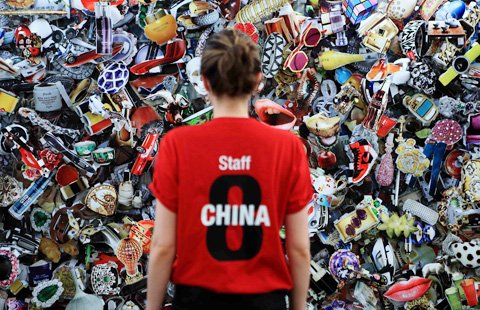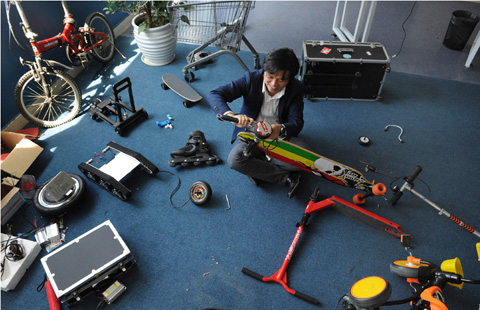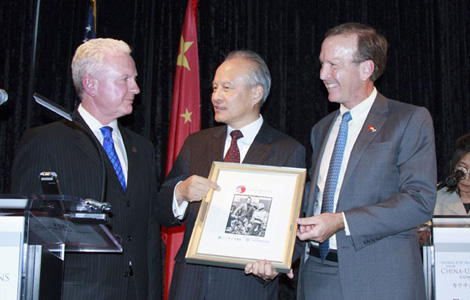Shanghai serious about proper English signs
Updated: 2015-05-13 07:43
By Li Xueqing in Shanghai and Cang Wei in Nanjing(China Daily)
|
||||||||
If you see a sign at a Chinese airport asking you to "stand outside one bowl of rice noodle", it actually means "keep a distance of one meter from the person standing in front of you".
It's a funny translation and one of many that are seen in China. Signs in some toilets, for example, read "easy come, easy go", which are intended to mean "come in a rush, leave with a flush". Then there are the many shops named "translation error" - their owners simply used online translation software and had the names printed without consulting an English speaker.
"Some word-to-word translations are really hilarious, especially in some restaurants whose English menus suggest very eerie ingredients," said Ma Ding of the General Consulate of Finland in Shanghai. "But they have also brought a lot of laughs to us."
Although funny translations haven't caused any troubles for Ma or his colleagues, he still urges the standardization of English signs and instructions in public spaces so that they help foreigners more effectively.
To regulate such translations, Shanghai has established an online platform for the public to obtain correct translations and report inaccurate ones.
Many college students in Shanghai have volunteered to check English translations in the city's public places. They will take pictures and report the mistakes. People who notice inaccurate translations also can call a hotline to report them.
The city has formed a foreign language translation expert committee as well to provide professional translation for people in need.
"Proper English signs and instructions show how international a city is," said Liu Danyan, a Shanghai native who works for a public relations firm in the city.
"English signs and instructions are especially important for tourists," she said.
Her view is shared by Dan Cheng, manager of the planning department of Shanghai Book Co. "The correction of English instructions is important because Shanghai is a city open to the world," he said.
However, foreigners generally don't think Chinese-English, dubbed Chinglish, or wrong instructions are necessarily a bad influence on the city's image, said Zhao Ronghui, professor of linguistics at Shanghai International Studies University.
Some works featuring Chinglish translations have attracted the attention of linguists, Zhao said. Take Kirk Kenny's Laugh Die Me, for example, which tackles 164 funny Chinglish mistakes. The book's name is a typical Chinglish translation of "laugh myself to death".
"Their works have no intention of teasing the Chinese for their English proficiency. They are for fun," Zhao said. "After all, they know that English is a foreign language for the Chinese."
Contact the writers through cangwei@chinadaily.com.cn
(China Daily 05/13/2015 page4)

 Heads of state show you around Xi'an
Heads of state show you around Xi'an
 Cross dressing for Peking Opera
Cross dressing for Peking Opera
 Ten photos you don't wanna miss - May 13
Ten photos you don't wanna miss - May 13
 Passionate creatives with fresh ideas
Passionate creatives with fresh ideas
 Chinese buyers spend $116m at art auction in NY
Chinese buyers spend $116m at art auction in NY
 Portrait of a health conference
Portrait of a health conference
 China and Russia hold naval exercise
China and Russia hold naval exercise
 Ten photos you don't wanna miss - May 12
Ten photos you don't wanna miss - May 12
Most Viewed
Editor's Picks

|

|

|

|

|

|
Today's Top News
Cui Tiankai: What US, China can do for a win-win in Asia
Animated Deng Xiaoping set to hit silver screen this week
Foreign reserves show a record decline in Q1
Amtrak train derails in Philadelphia, kills 5 people
Kerry off to China ahead of key talks
Beverage battle in China goes beyond colas
Volvo picks South Carolina for plant
Anti-graft body stresses inspections at lower levels
US Weekly

|

|







